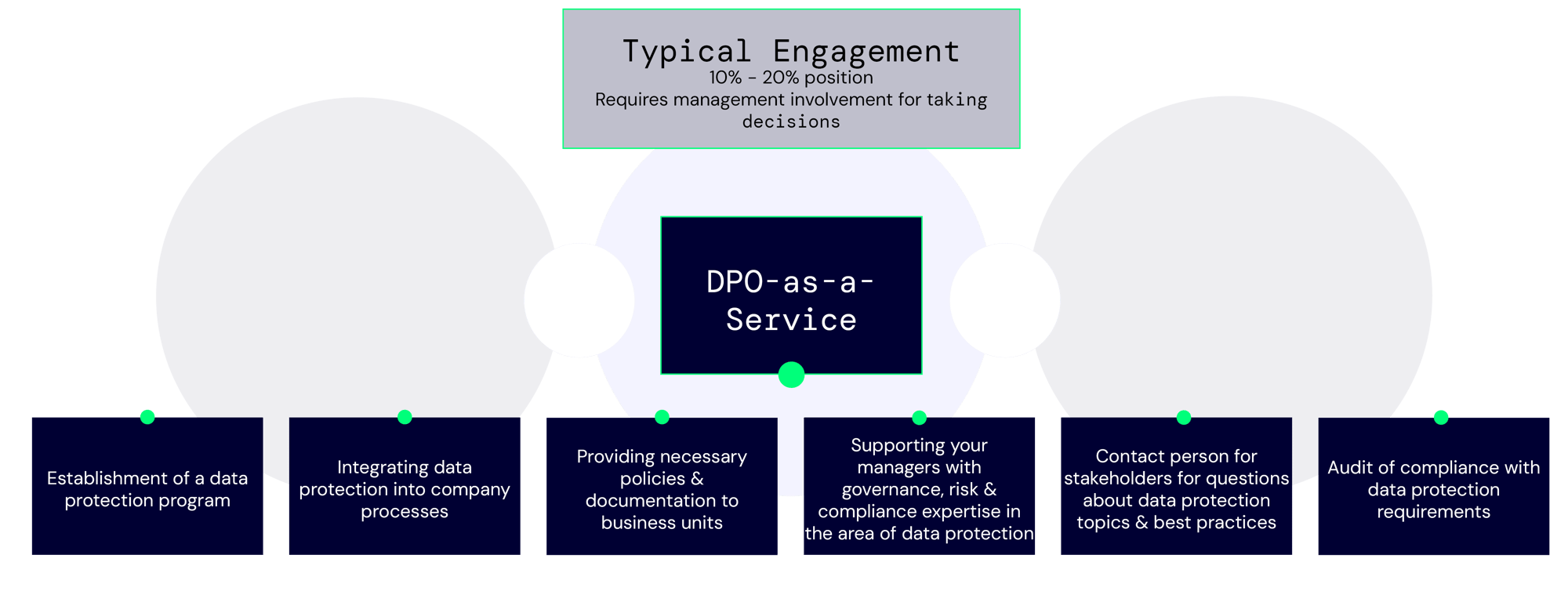DPO as a Service
Whitepaper: Building Resilience with the Right Strategy: Setting Up IT Security Effectively
A guide to creating lasting security
Read now
Data Protection Expertise, Right by Your Side
With BNC's DPOaaS (Data Protection Officer as a Service), you gain access to certified data protection professionals who oversee and enhance your data protection processes. We ensure your organization remains fully compliant with applicable regulations, providing demonstrable proof. Our expertise in Governance, Risk, and Compliance (GRC) and IT enables us to implement your data protection requirements efficiently and effectively.
Certified Expertise: You’ll benefit from experts fully certified in data protection, with a comprehensive understanding of legal mandates.
GRC and Technical Proficiency: We combine GRC knowledge with engineering expertise to address all relevant security aspects.
Pragmatic, Actionable Solutions: Together, we develop solutions that are both practical and impactful.
Risk-Based Approach: We embed risk management into your Information Security Management System (ISMS) to ensure lasting security enhancements.
Relevant Data Protection Regulations
The data protection laws applicable to your company depend on the type of data you process. If your operations are based exclusively in Switzerland, the Swiss Data Protection Act (DSG) and its corresponding ordinance will apply. However, if you handle data from EU citizens, you must also comply with the General Data Protection Regulation (GDPR) or any other relevant country-specific regulations.
Ensuring Data Protection Compliance
To ensure your company is fully compliant with data protection laws, you first need a complete overview of the data you process and the corresponding legal requirements. Conducting a GAP analysis provides a structured approach to identify any shortcomings. Additionally, conducting security awareness training for your staff prepares them for potential data incidents and helps test their response readiness.
Supplier Management in Data Protection
As the party responsible for processing personal data, you must ensure that your suppliers and service providers adhere to data protection regulations. An effective supplier management system helps you fulfill your contractual and regulatory obligations, safeguarding data throughout your supply chain. If required, you must be able to demonstrate the security measures implemented within that supply chain.
Blog: Security Architecture & Design
Discover how a structured security architecture protects your IT infrastructure from threats and ensures long-term resilience.
Read now!
DPOaaS: A Tailored Solution for Your Business
DPOaaS can serve as an efficient alternative to an in-house Data Protection Officer, especially for companies with less complex data processing needs. Once the initial data protection processes and documentation are in place, DPOaaS offers a cost-effective way to maintain compliance on an ongoing basis. For many Swiss companies, this flexible service provides the professional oversight needed to keep data protection practices up to date without the full-time overhead of an internal role.
Conclusion: Why BNC DPOaaS?
BNC’s DPOaaS offers a flexible, professional solution to meet your company’s data protection requirements. Our certified experts bring deep legal and technical expertise to address every aspect of your data protection strategy. We focus on providing pragmatic, actionable solutions and seamlessly integrate a risk-based approach into your ISMS, ensuring your data protection processes are both efficient and scalable.

FAQ DPO as a Service
-
When is a DPOaaS offering the right choice for us?
A DPOaaS monitors data protection-related processes, provides assistance, and advises the management of your organization. If you already have a functioning system in place, a DPOaaS can take over these tasks.
If you are just starting out, our Information Security Consulting team can advise you and help integrate or establish an appropriate data protection management system in your ISMS. Subsequently, a DPOaaS can take over maintenance.
-
What does a DPOaaS engagement look like?
A DPOaaS typically involves a fixed engagement of 10-20%. The main task is to support the various stakeholders in the data protection processes and maintain the management system. In the event of changes in the framework conditions or as needed, the DPOaaS advises management and prepares decisions.
-
What can we not delegate to a DPOaaS?
The DPOaaS has an advisory and monitoring function. You cannot delegate responsibility for decisions to this service.
Additionally, the implementation of data protection processes and the documentation of your data processing cannot be carried out solely by a DPOaaS. For this, BNC offers a consulting team that assists you on a project basis to quickly achieve data protection compliance.
BNC does not provide legal clarifications. For legal questions, you should consult your preferred law firm.
-
What are the consequences if we do not comply with data protection regulations?
The penalties for non-compliance with data protection regulations can quickly reach hundreds of thousands to several million, depending on the scope of processing activities and the risks to the individuals affected.
There are already numerous rulings regarding GDPR in the EU. These penalties are imposed on companies based on their revenue. In Swiss data protection law, however, personal fines are imposed, which are capped at CHF 250,000 per incident and violation. However, if there are multiple violations within a single incident, these can accumulate, potentially leading to fines of up to one million per involved individual.
So far, there have been only a few rulings in Swiss case law, making the financial risk still difficult to assess.
-
When and how do we fulfill our reporting obligations?
There are different types of reporting obligations. Certain types of data processing must be registered and reviewed in advance. However, often a breach of data security or data leakage is subject to reporting. The report must be made as quickly as possible; according to GDPR, this must be done within 72 hours. Additionally, information obligations must be taken into account to inform the affected individuals about the incident, risks, and measures taken.
To meet these requirements, it is important to prepare and document responsibilities and processes before an incident occurs, as well as to practice them.
